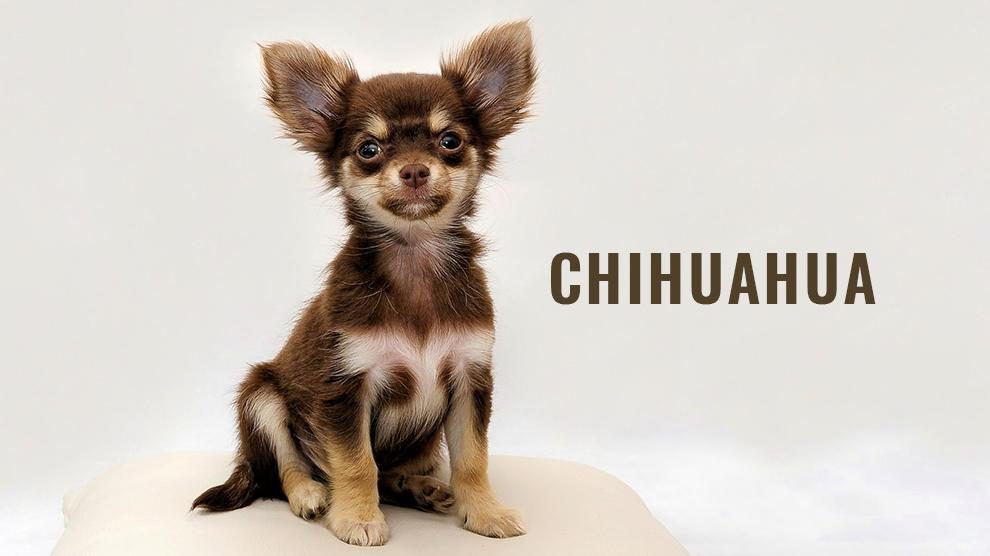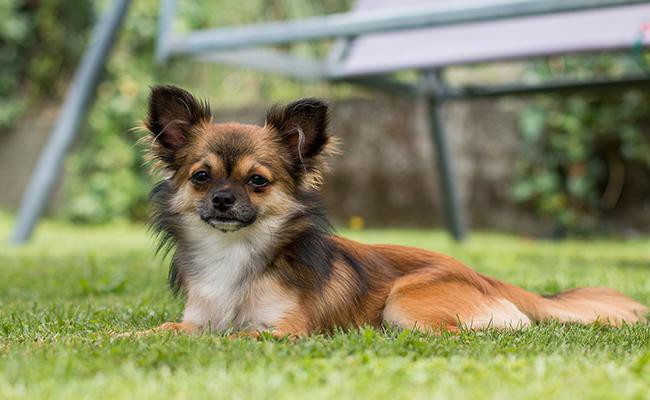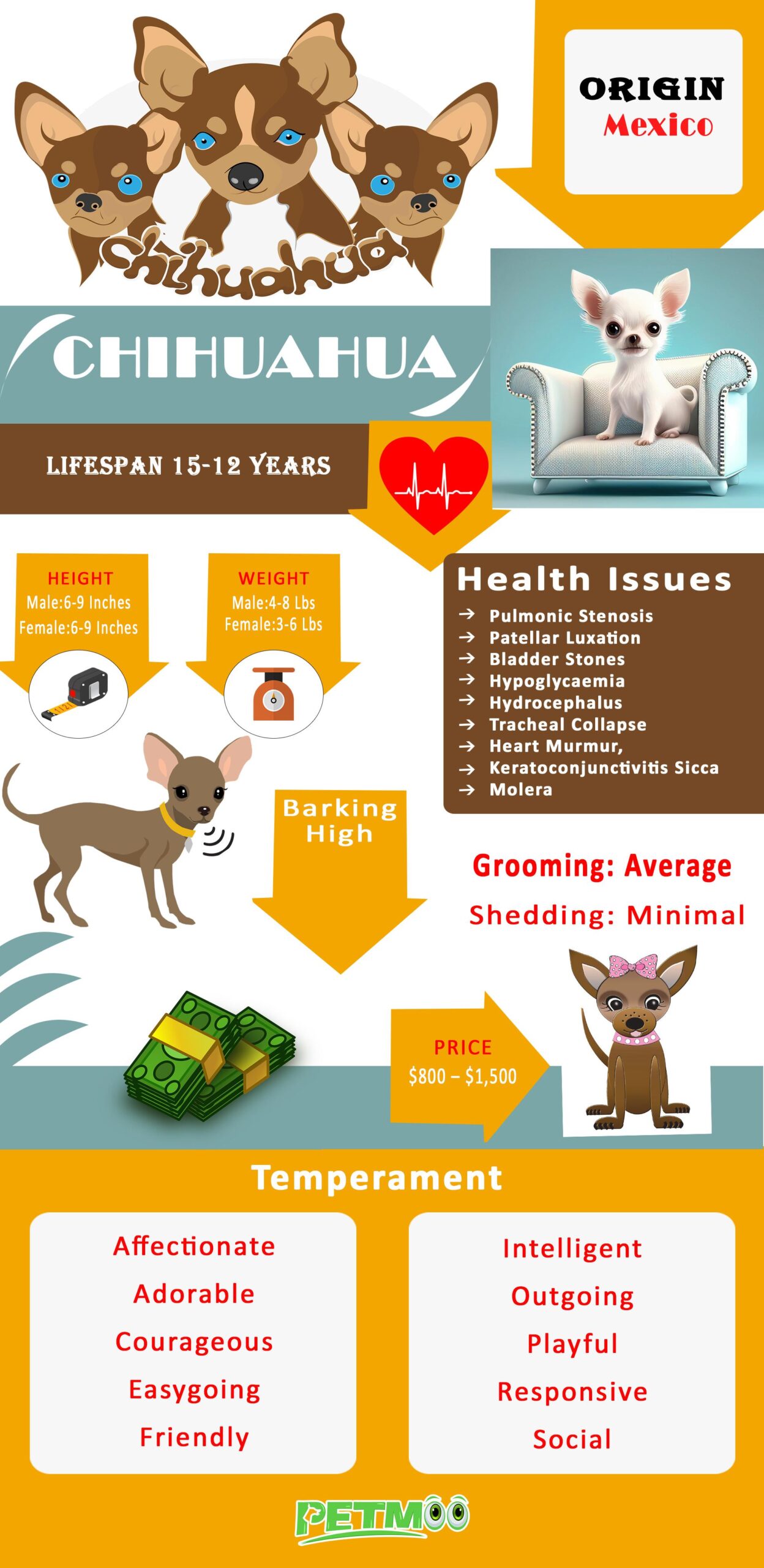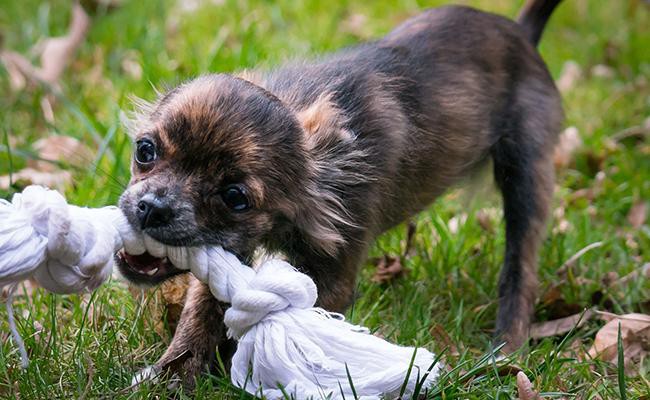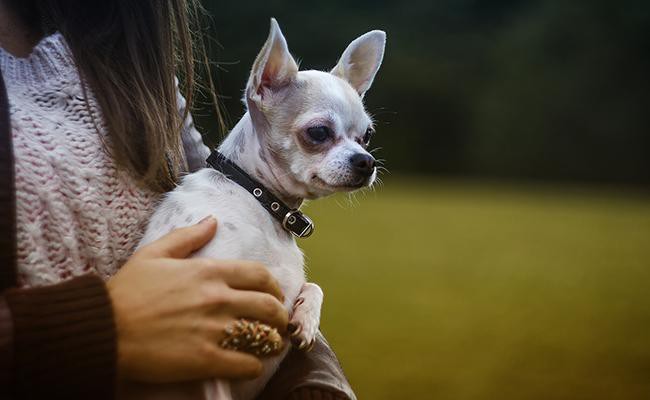- Chihuahua Breed Characteristics
- Chihuahua History
- Chihuahua Infographic
- Is Chihuahua, The Right Dog For You?
- Chihuahua Size
- Chihuahua Lifespan
- Chihuahua Coat Color
- Chihuahua Appearance
- Applehead vs Deerhead
- Chihuahua Temperament
- Chihuahua Personality
- Chihuahua Training
- Chihuahua Care
- Chihuahua Food
- Chihuahua Grooming And Shedding
- Chihuahua Health Problems
- Chihuahua Puppies Names
- Chihuahua Price
- Chihuahua Breeders
- Chihuahua FAQs
Dog Pregnancy Calculator And Timeline
In the vast realm of canine companions, the Chihuahua stands out as a captivating breed that has won the hearts of dog lovers worldwide.
Despite their diminutive size, Chihuahuas possess a larger-than-life personality that belies their petite stature. Originating from Mexico, these pint-sized pooches have become an iconic symbol of charm and companionship.
Let’s learn more about the enchanting world of Chihuahuas, exploring their unique traits, endearing qualities, and the joys they bring to their owners’ lives.
From their distinctive apple-shaped heads and expressive eyes to their unwavering loyalty and lively nature, Chihuahuas exude an irresistible charisma that sets them apart.
Chihuahua Breed Characteristics
- Origin: Mexico
- Size: Small
- Dog Breed Group: Toy Dog(AKC, CKC, KC), Companion Dogs(UKC)
- Purebred: Yes
- Lifespan: 15-20 Years
- Height: Male:6-9 Inches (15 – 22 Cm), Female: 6-9 Inches (15 – 22 Cm)
- Weight: Males: 2 – 4 Kg (4-8 Lbs) And Females: 1.5 – 3 Kg (3-6 Lbs)
- Coat Appearance: Long Coated Or Smooth Coated
- Coat Colors: Six Main Colors Black, White, Fawn, Chocolate, Gray, And Silver As Well As Tricolor (Black, Chocolate, Or Blue With Tan And White, For Instance)
- Temperament: Affectionate, Adorable, Courageous, Devoted, Easygoing, Friendly, Laidback, Intelligent, Keen, Outgoing, Playful, Pleasant, Responsive, Social, Spirited
- Good With Children: Yes
- Intelligence Level: High
- Good With Pets: No
- Hypoallergenic: Yes
- Grooming: Average
- Shedding: Minimal
- Barking: High
- Suitable For Apartments: Yes
- Need For Exercise: Average
- Easy To Train: No
- Good For First Time Owners: No
- Health Issues: Pulmonic Stenosis, Patellar Luxation, Bladder Stones, Hypoglycaemia, Hydrocephalus, Tracheal Collapse, Heart Murmur, Keratoconjunctivitis Sicca, Molera
- Litter Size: 2-5 Puppies
- Average Price: $500 – $1000
Chihuahua History
The Chihuahua is a small dog breed believed to have originated in Mexico, named after the state of Chihuahua. It descended from the ancient Techichi dogs, bred by civilizations like the Toltecs and valued for their sacred qualities.
After the Spanish conquest, Techichis interbred with European toy breeds. In the late 19th century, Mexican merchants sold Chihuahuas to tourists, leading to their popularity in the United States.
The Chihuahua Club of America was founded in 1904, and the breed was recognized by the AKC in 1908. Chihuahuas are known for their small size, and lively personality, and are cherished as loyal companions and fashion accessories.
Is Chihuahua, The Right Dog For You?
If you want a dog who…
- Is playful, comical, little munchkin – not a subtle lapdog
- Is biddable, content to live in an apartment or house
- Are Low shedders and a sleek easy-care coat
- Is well-mannered with everybody, including other pets
- Is an Intelligent, quirky, and eccentric personality
- Needs lesser exercise requirements and shorter walks
A Chihuahua may be right for you.
If you don’t want to deal with…
- Stubbornness and excessively possessive of families and owners
- Sometimes prickly and may adopt “small dog syndrome “
- Suspiciousness and yappy behavior,
- Roguish if acquired from bad lineage when babied or spoiled or not socialized enough
A Chihuahua may not be right for you.
However, they were made for lovin’ you, buddy. Still not convinced? Keep reading
Chihuahua Size
- Height (Average) – Male:6-9 inches (15 – 22 cm), female: 6-9 inches (15 – 22 cm)
- Weight (Average) – Males: 2 – 4 kg (4-8 lbs) and Females: 1.5 – 3 Kg (3-6 lbs)
The breed standard weight for the show ring Chi dogs with popular kennel clubs are:
- AKC – Should not exceed 6 lbs. (2.72 kg).
- FCI – 1.5 to 3 kg (3 to 6 lbs.) preferred. Dogs weighing more than 3 kg (6.61 lbs.) and less than 500 grams (1.10 lbs.) shall be disqualified.
- CKC (Canadian Kennel Club) – 2-4 lb. (1-2 kg) preferable. Should not exceed 6 lbs (2.72 kg),
- KC – 1.8 to 2.7 kg is ideal (3.96 to 5.95 lbs.).
So, it is obvious that there is a general consensus that a chi dog in the show ring will be less than 6 pounds (2.72 kg) while the FCI allows him to be a tad larger. However, many pet Chihuahuas are 7-10 pounds and even more.
Chihuahua Lifespan
The Chihuahua dog’s lifespan is perhaps the longest in the canine clan. If everything is as it should be, you can expect your diminutive companion to hang around for ages, at least by canine standards.
The current data suggest that these dogs live an average of 15-20 with females typically having 1 to 2 years longer than males.
Chihuahua Coat Color
There are 30 AKC-recognized colors (some are combinations).
- Six Main Colors Black
- White
- Fawn
- Chocolate
- Gray
- Silver As Well As Tricolor (Black, Chocolate, Or Blue With Tan And White, For Instance)
A complete list of colors accepted by AKC
S = Standard color
A = Alternate color
- Black (S 007)
- Black & Tan (S 018)
- Blue & Tan (S 044)
- Chocolate (S 071)
- Chocolate & Tan (S 072)
- Cream (S 076)
- Fawn (S 082)
- Fawn & White (S 086)
- Red (S 140)
- Black & Red (A 014)
- Black & Silver (A 016)
- Black & White (A 019)
- Black Sabled Fawn (A 354)
- Black Sabled Silver (A 353)
- Blue (A 037)
- Blue & White (A 045)
- Blue Brindled Fawn (A 356)
- Blue Fawn (A 036)
- Chocolate & White (A 271)
- Chocolate Blue (A 359)
- Chocolate Brindled Fawn (A 355)
- Chocolate Sabled Fawn (A 358)
- Cream & White (A 077)
- Fawn Brindled Black (A 357)
- Gold (A 091)
- Gold & White (A 092)
- Red & White (A 146)
- Silver (A 176)
- Silver & White (A 182)
- White (A 199)
AKC-approved official markings include
- Black Brindling (S 073)
- Black Mask (S 004)
- Black Sabling (S 072)
- Merle Markings (S 035)
- Spotted On White (S 071)
- White Markings (S 014)
- Black Mask, White Markings (A 005)
- Blue Mask (A 006)
- Cream Markings (A 044)
- Fawn Markings (A 008)
- Red Markings (A 023)
Coat
When it comes to their coat, Chihuahuas can either be long-coated or smooth-coated (short coat) with hair that is soft to the touch and which has a natural sheen.
Long-Coat Breed
- Soft texture, semi-fluffy fur coat.
- Fur can be either flat or naturally wavy.
- The mayor may not have Undercoat
- Longer hair on the fringe of ears, neck (ruff), back of legs, feet, and on the tail (plume). Short hair on head and face.
- It may take up to 12 months transition time for puppy fur to fall out and you see the full adult fur of long coat chihuahua
- Grooming needs: Moderate
- Shedding: low
Smooth-Coat Breed
- Short fur coat and even coverage all over the body
- soft texture, Glossy and fluffy
- Excess hair around the neck and tail is preferred. more scanty on the head and ears
- fur will be more visible for Beige and light hair dogs
- Grooming needs: Low
- shedding: low
Did long coat vs. Smoothly coated chihuahuas: which is right for you?
The coat of smooth coat and the long-coated chihuahua is generally opposite of what they sound.
Long-haired chihuahuas are smoother to the touch and actually shed less hair than their shorter-haired counterparts. However, they do require brushing, around yearly trimming and grooming. Surprisingly, a short-coated chi dog sheds more which needs more brushing and regular grooming.
The first to consider is what sort of yard or garden you have if any. A long coat will pick up dirt, mud, grass, and weeds in their coat which can be a real bother brushing out all the time.
Do you feel like cleaning your furniture and clothes often when your smooth coat chi dogs shed hair all over them?
How frequently do you want to brush your chihuahua once a day or once a week?
When all’s said and done, they are both the same breed and either one will make a lovable companion.
Chihuahua Appearance
Chihuahuas are small dogs with a distinctive and adorable appearance. One of their most recognizable features is their apple-shaped head, complemented by large, luminous eyes that exude a lively and alert expression.
Their ears are usually erect and stand upright, adding to their attentive and inquisitive appearance.
Chihuahuas come in a variety of coat types and colors. The smooth-coat variety has short, shiny fur that lies close to its body, while the long-coat variety has soft, flowing fur that can be either straight or slightly wavy.
Their coat colors can range from solid black, white, or tan to various combinations such as brindle, merle, and spotted patterns.
Despite their small size, Chihuahuas possess a captivating charm and undeniable cuteness that make them stand out in any crowd.
Applehead vs Deerhead
Officially, Chihuahua has only two official variations, the long coat, and the smooth coat. But there are also apple-head and deer-head Chihuahuas.
The notable differences between an apple head and a deer head Chihuahua involve the skull (well-rounded vs slopey), the muzzle (short vs long), the stop (well-defined- close to a 90-degree angle vs sloped- 30 to 45-degree angle), the body proportions (off-square vs long and tall) and the neck (moderate vs long).
Despite the prevalence of the deer head chi dogs, it is the apple head that fits the breed standard. All popular kennel clubs make reference to either an apple head’ or ‘apple domed’ skull.
Teacup Chihuahua
Teacup, Toy, purse, micro, mini– if you see any of those terms before the word “Chihuahua,” you’re seeing a description, not a different breed.
Even though a “big” Chihuahua! Conforming to breed standard weighs little more than a bag of flour, there’s still demand for toy-sized pups.
A Chi dog may weigh as little as 3 pounds and some breeders, in an attempt to be noticeable from the pack, may breed “teacup” Chihuahuas.
As there is no officially recognized teacup size– or toy, mini, micro, purse-sized — breed of Chihuahua, the “teacup” size can mean just about anything, usually lesser sized than the standard Chihuahua.
Chihuahua Temperament
Here are some key traits that characterize the temperament of chihuahuas:
- Lively: Chihuahuas are known for their high energy levels and liveliness. They possess a spirited and playful nature that keeps them constantly on the go.
- Courageous: Despite their small size, Chihuahuas are remarkably brave and fearless. They often exhibit a bold and confident demeanor, fearlessly taking on challenges.
- Alert: Chihuahuas make excellent watchdogs due to their keen sense of alertness. They are quick to sense any potential danger or unfamiliarity in their surroundings and will bark to alert their owners.
- Devoted: Chihuahuas form strong bonds with their owners and are incredibly loyal companions. They thrive on attention and affection and love to be near their favorite humans.
- Wary of strangers: Chihuahuas can be reserved and cautious around strangers. They may exhibit a protective nature, often barking or displaying defensive behaviors when encountering unfamiliar people.
- Affectionate: Despite their occasional aloofness, Chihuahuas are also known for their affectionate nature. They enjoy being cuddled, snuggling up with their owners, and showering them with love.
- Independent: Chihuahuas have an independent streak and may display a stubborn side. They appreciate having their own space and may not always comply with commands or training.
Chihuahua Personality
Adaptability
- Apartment Living – Yes
- Good For First-Time Owners – Yes
- Sensitivity Level – High
- Loneliness – Not Suited To Be Alone
- Cold Weather – Average
- Hot Weather – Low
Friendliness
- With Family – High
- Kids – High
- Other Dogs – Reserved
- Cats – Average, Reserved
- Other Pets – Average, Reserved
- Strangers – Suspicious
General Behavior
- Independence – No
- Dominance – Moderate
- Combativeness – Bit Aggressive
- Indoors – Active
- Outdoor – Highly Active
- Territorial – Yes
- Easy Of Transportation – Very Good
Who Gets Along With Chihuahua Dogs?
- Family with older kids
- Active household
- Singles, shut-ins, seniors, and physically challenged
- Apartments, condos, houses with/without yards
Chihuahua Training
- Trainability – Easy
- Intelligence – Average
- Memory – High
- Mouthiness – Low
- Prey Drive: High
- Barking – High
- Wanderlust Potential – High
This is a highly submissive breed but is known to be a little more difficult to train than other breeds.
He can be mischievous and might take a little more time housebreaking. Don’t let your Chi’s hilarious antics fool you in training him.
The Chi puppies are typical little goofballs! Pleasant, playful, and puckish.
It’s highly recommended that your pet should be exposed to all kinds of noises, situations, people, and other dogs as possible so as to make sure they get a friendly dog once their pup reaches adulthood.
Basic obedience training and early socialization are good for setting a solid foundation but it alone won’t solve all behavior issues.
In the right hands, Chis are a “whip-smart” learner and they thoroughly enjoy the one-to-one connection they have with their trainers.
Whatever the problem is– whether barking, yapping, aggression, or potty training Chihuahua – there are solutions. The highly intelligent nature of Chi dogs can play a big part when trained properly.
The most important thing to do is to begin their training from a young age and to be consistent with it.
When these rare ruffers are left alone too much or improperly socialized, they can get separation anxiety which can lead to yapping, chewing, scratching, and digging.
The key to successfully training these small dogs is to take your time and go through a short training routine. Positive reinforcement really is the best way to train them.
Negative approaches or harsh corrections don’t really work with this breed.
Chihuahua Care
1. Proper nutrition: Feed your Chihuahua a balanced diet with high-quality dog food formulated for small breeds.
2. Regular exercise: Chihuahuas need daily exercise to maintain a healthy weight and prevent boredom. Short walks and play sessions are ideal.
3. Grooming: Brush your Chihuahua coat regularly to prevent tangles and mats. They may also need occasional baths and nail trims.
4. Dental care: Chihuahuas are prone to dental issues, so brush their teeth regularly and provide dental treats or toys.
5. Socialization: Expose your Chihuahua to different people, animals, and environments from an early age to prevent fear or aggression.
6. Training: Start obedience training early to teach basic commands and proper behavior. Use positive reinforcement techniques.
7. Health care: Schedule regular vet check-ups, vaccinations, and parasite prevention. Chihuahuas may have specific health issues like patellar luxation or dental problems.
8. Safety measures: Chihuahuas are small and fragile, so supervise them around larger dogs, provide a secure environment, and avoid rough play.
9. Mental stimulation: Engage your Chihuahua with interactive toys and puzzles to keep their minds active and prevent boredom.
10. Love and attention: Chihuahuas thrive on companionship, so spend quality time with them, offer plenty of affection and provide a comfortable sleeping area.
- Exercise Needs – Average
- Intensity – High
- Activity Level – Low
- Exercise Requirements – >30 Minutes/Day
- Walk Mileage/ Week – 6 Miles
- Playfulness – High
- Grooming Needs – Average
- Tendency To Drool – No
- Snore – No
- To Bark – High
- Dig – No
- Social/Attention Needs – High
Chihuahua Food
When caring for a Chihuahua’s food, ensure a high-quality, balanced diet tailored to their size and age. Feed them small, frequent meals to prevent hypoglycemia.
Avoid overfeeding to prevent obesity. Provide fresh water at all times. Consult a veterinarian for specific dietary recommendations and any potential allergies or sensitivities.
Chihuahua Feeding Chart
For getting the caloric requirements for Chihuahua dogs, you should calculate the resting Energy Requirements (RER) and multiply it by their activity level.
A dog’s RER is 30 times * body weight in kilograms + 70.
a) A puppy (0-4) months need three times its RER
b) An adolescent over the age of four months needs 2 * RER
c) An active adult needs 2-5 times its RER
d) A healthy, active Chi dog should be fed about 25-30 calories worth of food per pound of body weight.
So, generally,
- An active, adult dog in the (8 lbs) range should get around 300-380 calories per day.
- Sedentary Chis need 300 calories per day
- Puppies in the (3 lbs) weight range should get around 120-180 calories/day
- The average adult dog should get 400 calories per day
Chihuahua Puppies Food
Puppies need to be fed a highly nutritious, wholesome diet; In general, a Chi puppy should be fed with their meals evenly spread out throughout the day.
It’s best to feed 2 or 3 times daily or even on an ‘ad libitum’ basis (always keeping a dish of food out)
- CUPS: 0.8-1 cup
- Daily cost: $0.75 – $1.00 (average)
- Monthly cost: $20.00 – $30.00
- Pups between 2-3 months old – 3 meals every 24 hours (30g- 80g).
- 4 to 6 months old – 3 meals every 24-hour period (80 g)
- Feed puppies 6 – 8 months – 2 bowls of food daily (60g)
- When your chi puppy is 9 months old, 1 small bowl spread evenly every 24 hours is typically all that’s necessary.
How Much Should Feed Chihuahua?
Remember, the feedings depend on the puppy’s build. Once a Chi dog is 9 months old it can be fed adult dog food depending on their activity level, eating tendencies, and health.
- Dogs weighing-1.5 kg = 40g-80g
- Dogs 2 kg =40g-60g
- Dogs weighing 2.7 kg = 50g-60g
- Protein content should be anything from 14 – 25%
- Carb content should be 30 to 65%
- Fiber content should be less than 4%
- Fat content should be less than 8%
- Calcium content should be 0.5 – 0.8%
- Phosphorous content should be 0.4 – 0.7%
- Sodium content should be 0.2 – 0.4%
Chihuahua Foods To Avoid
Chihuahua Grooming And Shedding
- Coat Density – Normal
- Coat Length – Medium
- Coat Texture – Straight
- Brushing Frequency – Weekly
- Trimming/Stripping – No
- Hypoallergenic – No
- Shedding – Minimal
Now, if you want an independent dog that will not be much of work then the Chiwawa is perhaps the dog for you.
However, you should prepare for this dog to shed, as some Chis have a longer-than-average coat. So you’ll want to ensure you take care of their coats as much as necessary.
This means that you need to brush their coat on a daily basis to trap loose fur before it sheds.
Chihuahua Grooming Needs:
In General, Chihuahua dogs are low shedders but they shed profusely during the shedding seasons.
Chihuahua dogs that have got a really thick coat will shed (aggressively, almost) during warmer months to cool down for the summer month.
Regular brushing will not only keep their coats and skin in good condition, but it will help keep any shed hair under control.
Chihuahua Health Problems
Major concerns:
- Pulmonic Stenosis
- Patellar Luxation
- Bladder stones
- Hypoglycemia
Minor concerns:
- Hydrocephalus
- Tracheal Collapse
- Keratoconjunctivitis Sicca
- Heart Murmur
- Molera
Chihuahua Puppies Names
Chihuahua Male Puppies Name
- Bruno
- Bruiser
- Coco
- Chico
- Duke
- Dynamite
- Gibson
- Gunner
- Tucker
- Thrasher
Chihuahua Female Puppies Name
- Bella
- Chequita
- Crystal
- Daisy
- Honeybee
- Kitty
- Karen
- Rosita
- Tulip
- Vanilla
Chihuahua Price
The price of a Chihuahua can vary depending on several factors such as the dog’s pedigree, lineage, age, location, and the reputation of the breeder. On average, Chihuahuas can range anywhere from $500 to $1,500, but prices can go even higher for show-quality or rare color variations.
Adopting a Chihuahua from a shelter or rescue organization is another option, which typically incurs lower costs, ranging from $50 to $300.
It’s important to note that regardless of the price, responsible ownership includes considering ongoing expenses such as food, vaccinations, grooming, veterinary care, and other supplies to ensure the dog’s well-being.
Chihuahua Breeders
When searching for Chihuahua breeders, it’s crucial to find reputable ones who prioritize the health and well-being of their dogs. Look for breeders who provide proper care, health screenings, and socialization for their puppies.
Seek recommendations from local Chihuahua clubs or organizations, and visit the breeder’s facility in person to assess their practices and the conditions in which the dogs are raised.

Click here to find Chihuahua breeders in the USA.
Chihuahua FAQs
1. Are Chihuahua Easy To Train?
Chihuahuas are not the best choice for first-time dog owners because they can be a little bit of a challenge when it comes to training them thanks to the fact they like to do things in their own time and are quite independent thinkers by nature.
In this regard, No owner is going to have an easy time with this small breed. Their stubborn traits and personalities mean that they can exhibit a few behaviors that are troublesome and hard to shake.
However, it is better to deal with each problem individually from an early age.
Moreover, investing in the best guides and experts as well as experienced owners’ opinions. Once you know how to train a Chihuahua puppy (even for new owners), there is no stopping the pair of you.
2. Does Chihuahua Shed?
Yes, Chihuahuas do shed, but their shedding is typically minimal compared to many other dog breeds. They have short, thin coats that require minimal grooming and tend to shed less hair.
However, shedding can vary among individual Chihuahuas. The amount of shedding can also depend on factors such as genetics, health, and seasonal changes.
Regular brushing can help minimize loose hair and keep their coat healthy. Additionally, providing a balanced diet, regular exercise, and proper grooming can contribute to overall coat health and reduce excessive shedding.
You will find that they can be good-natured, well-behaved, house-trained dogs with the right effort.
3. Are Chihuahua Pets?
Chihuahuas can make wonderful pets for the right owner. They are known for their loyal, affectionate, and loving nature. Despite their small size, they often have big personalities and can form strong bonds with their owners.
Chihuahuas are generally good with families, including children, if properly socialized and trained. They require moderate exercise and can adapt well to apartment living.
However, they may not be suitable for households with very young children or larger, more active pets. Chihuahuas also thrive on companionship and may develop separation anxiety if left alone for long periods. Overall, they can be delightful, devoted companions for responsible owners.
4. Are Chihuahua Mexican?
Yes, Chihuahuas are believed to have originated in Mexico. The breed is named after the Mexican state of Chihuahua, where they were first discovered.
Chihuahuas are often associated with Mexican culture and are considered one of the oldest dog breeds in the Americas. They have a rich history and are sometimes referred to as the “smallest breed with the biggest heart.”
Their popularity has spread worldwide, but their origins can be traced back to Mexico.
5. When Do Chihuahuas Stop Growing?
Chihuahuas typically reach their full adult size by the time they are around 10 to 12 months old.
However, it’s important to note that growth rates can vary among individual dogs, and some Chihuahuas may continue to fill out and develop muscle tone until they are around 18 months old.
Providing a balanced diet, appropriate exercise, and regular veterinary check-ups can support their healthy growth and development. If you have concerns about your Chihuahua’s growth, it’s always best to consult with a veterinarian.
6. Can Chihuahua Swim?
While Chihuahuas can technically swim, not all of them are natural or strong swimmers. Due to their small size and short legs, they may have difficulty staying afloat for extended periods.
Additionally, their body structure with a large chest and small hindquarters can make it challenging for them to maintain buoyancy. It’s crucial to supervise them closely around water to ensure their safety.
If you want to introduce your Chihuahua to swimming, start with shallow water and provide a properly fitted life jacket for added buoyancy and security.
Always be cautious and attentive when allowing your Chihuahua near pools, lakes, or any bodies of water.
7. Can Chihuahua Eat Cheese?
Yes, in moderation, Chihuahuas can eat cheese. Cheese can be a tasty and high-value treat for them.
However, it’s important to consider a few factors. Some dogs may be lactose intolerant or have difficulty digesting dairy products, including cheese.
If your Chihuahua shows signs of digestive upset or intolerance after consuming cheese, it’s best to avoid giving it to them. Additionally, cheese should be given sparingly as a treat and not as a primary part of their diet.
Too much cheese can lead to weight gain or other health issues. Always introduce new foods gradually and consult with your veterinarian for specific dietary recommendations for your Chihuahua.
8. Can Chihuahua Eat Watermelon?
Yes, Chihuahuas can eat watermelon. Watermelon is a safe and refreshing treat for dogs, including Chihuahuas. It is low in calories and a good source of hydration due to its high water content.
However, it’s important to feed watermelon to your Chihuahua in moderation and with some precautions. Remove the seeds and rind them, as they can be a choking hazard or cause digestive issues.
Offer small, bite-sized pieces of the flesh as a treat or mix it into their regular food. As with any new food, introduce watermelon gradually to ensure your Chihuahua tolerates it well without any adverse reactions.
9. Can Chihuahua Eat Blueberries?
Yes, Chihuahuas can eat blueberries. Blueberries are a healthy and nutritious treat for dogs, including Chihuahuas. They are low in calories and high in antioxidants, fiber, and vitamins.
Blueberries can serve as a tasty snack or be mixed into their regular food. Make sure to wash the blueberries thoroughly before offering them to your Chihuahua.
Start with small portions to ensure your dog tolerates them well and doesn’t have any digestive issues. As with any new food, it’s always a good idea to introduce blueberries gradually and consult with your veterinarian if you have any concerns.

